Infant seats

Securing an infant seat with a seat belt
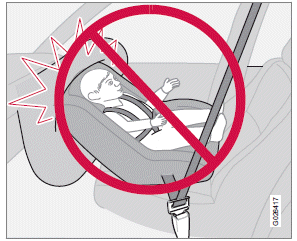
Do not place the infant seat in the front passenger's sea
NOTE
Refer to page 48 and page 50 for information
on securing a child restraint using
ISOFIX/LATCH lower anchors and/or top
tether anchorages.
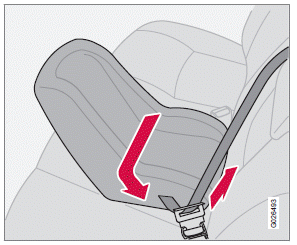
Positioning the seat belt through the infant seat
WARNING
Х An infant seat must be in the rear-facing
position only.
Х The infant seat should not be positioned
behind the driver's seat unless there is
adequate space for safe installation.
1. Place the infant seat in the rear seat of the
vehicle.
2. Attach the seat belt to the infant seat
according to the manufacturer's instructions.
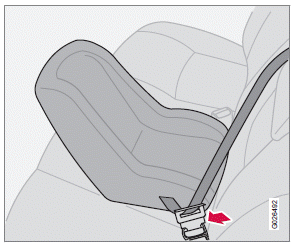
Fasten the seat belt
WARNING
A child seat should never be used in the
front passenger seat of any vehicle with a
front passenger airbag Ц not even if
the "Passenger airbag off" symbol near
the rear-view mirror is illuminated (on vehicles
equipped with Occupant Weight Sensor).
If the severity of an accident were to
cause the airbag to inflate, this could lead to
serious injury or death to a child seated in
this position.
3. Fasten the seat belt by inserting the latch plate into the buckle (lock) until a distinct click is audible.
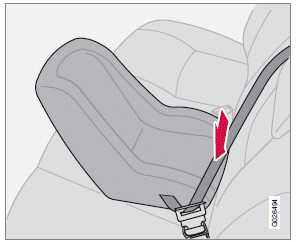
Pull out the shoulder section of the seat belt
4. Pull the shoulder section of the seat belt out as far as possible to activate the belt's automatic locking function.
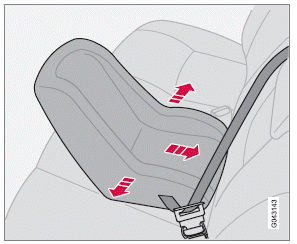
Ensure that the seat is securely in place
NOTE
The locking retractor will automatically
release when the seat belt is unbuckled and
allowed to retract fully.
5. Press the infant seat firmly in place, let the
seat belt retract and pull it taut. A sound
from the seat belt retractor's automatic
locking function will be audible at this time
and is normal. The seat belt should now be
locked in place.
6. Push and pull the infant seat along the seat
belt path to ensure that it is held securely
in place by the seat belt.
WARNING
It should not be possible to move the child
restraint (child seat) more than 1 in. (2.5 cm)
in any direction along the seat belt path.
The infant seat can be removed by unbuckling the seat belt and letting it retract completely.
See also:
Air distribution
The incoming air is distributed from a number of different vents in the passenger
compartment.
Air distribution is fully automatic in AUTO mode.
If desired, air distribution can be controlled ma ...
Low beam, Halogen
1. Remove the headlight housing from the
vehicle (see page 322).
2. Remove the cover over the bulbs (see
page 323).
3. Unplug the connector from the bulb.
4. Remove the bulb by pressing the h ...
Benefits of digital broadcasting
Х Better sound (FM sounds near CD quality
and AM as analogue FM).
Х Some FM frequencies offer a greater number
of listening choices through УmulticastingФ
(consisting of a frequency's main
ch ...
